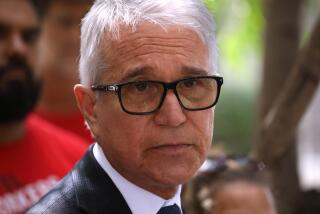Will Democracy Let Los Angeles Down? : Elections: With so many candidates, voters will have a tough time making a informed choice. Is it too easy to be a candidate for mayor?
- Share via
At a time when the Los Angeles mayoral race is attracting worldwide attention, something seems amiss: In some important respects, the serious candidates have to compete with the marginal for the spotlight. This is no occasion to celebrate a robust democracy in action, because it is L.A. voters who may be ultimately cheated.
When 52 women and men announced their intention to replace Tom Bradley, it made headlines around the country--the small ones above filler material--and probably reinforced the city’s oddball reputation. But whether the majority of candidates are truly out of touch or merely eccentric, their number has more serious consequences for the city.
Happily, only 31 of the 52 qualified for the April 20 ballot. Still, there is some cost to the city in processing all their papers, using employee time to field questions, validating the signatures on 31 petitions and so on. It is not a major cost in the scheme of things, and, in many respects, it is a burden a free society ought to shoulder without complaint.
There is another cost that is more serious, however. The City Ethics Commission planned to join with the League of Women Voters in hosting what everyone assumed would be the Big Debate, an exchange advertised in advance and televised widely so that voters who are not a member of an organization sponsoring its own debate--the overwhelming majority--would have an opportunity to see and listen to the candidates interact. But the city attorney advised the commission’s staff that they could not participate in a debate that limited the number of candidates.
Well, as it happens, the debate will go on without the Ethics Commission. There will be two of them, with probably no more than 11 candidates invited to participate. The most important criteria for inclusion will be an ability to qualify for public financing, which means they must have raised $150,000 in contributions of $500 or less, and a level of support in a professional poll of no less than 5%. That, still leaves a lot of candidates.
Two laudable values are in play here. One is the value of providing a forum for each candidate to express his or her views. The other is creating circumstances that will enable voters to make an informed choice. But with so many candidates clamoring for equal time, that will be difficult to do.
To be sure, there are other opportunities besides formal debates to express one’s candidacy: one can buy an ad, participate in non-debate events, walk the streets. But an open debate among a limited number of candidates offers voters the best chance to measure the would-be mayors against one another. Anything less is a sham.
It is always difficult to draw lines, but we must. For starters, the requirement that a candidate obtain the signatures of 500 registered voters and pay $300, or collect 1,000 signatures to avoid the fee, must be significantly raised. Surely, a city the size and breadth of Los Angeles ought to require a broader measure of support than that for access to the ballot.
The glut of candidates in the mayoral race reflects the hard fact that many jumped in simply because it is something to do. Of the 31 candidates, fewer than a dozen--people who have demonstrated their intelligence, leadership and commitment to the city--are appropriate for consideration. If voters cannot choose carefully among this dozen because the media must also devote attention to the other 19 or so candidates, Los Angeles will be deprived of a critical right at a critical time. There is too much noise in this race to hear clearly the messages of the serious candidates. Without that knowledge, we will be dependent on other factors to make up our mind--the slate mailers, the echoes of ethnicity, the candidate with the most money who can reach the largest audience.
That’s not exactly democracy in action. It is all the more disturbing because the opportunity to make a real, informed choice will be far greater in the primary than in the runoff, which could turn out to be a contest between a very strong candidate and one simply able to count on a confined constituency. That would indeed be sad for a city in desperate need of alternative voices.
More to Read
Sign up for Essential California
The most important California stories and recommendations in your inbox every morning.
You may occasionally receive promotional content from the Los Angeles Times.













